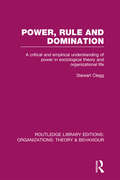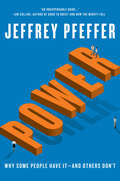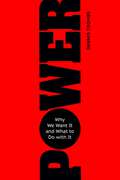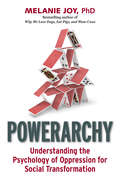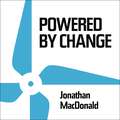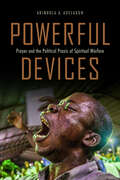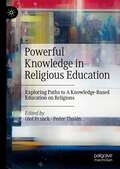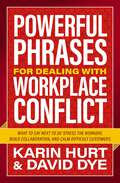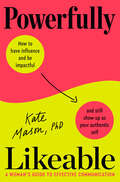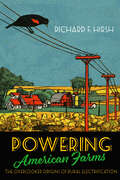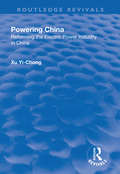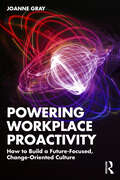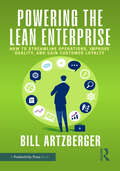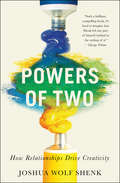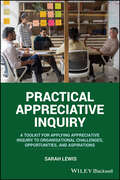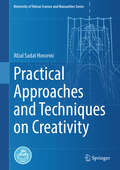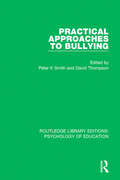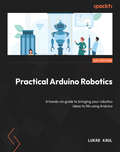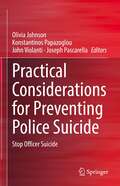- Table View
- List View
Power, Rule and Domination: A Critical and Empirical Understanding of Power in Sociological Theory and Organizational Life (Routledge Library Editions: Organizations)
by Stewart CleggThis volume presents a critical analysis of sociological theorizing and power which enables the reader to grasp fully the nature of power, rule and domination in organizational life. By making use of the discussions he recorded at a construction site, the author brings the reader into contact with the everyday social world in which he locates his analysis of power and authority at both a structural and phenomenological level. This analysis is complemented by the author’s review of the literature on ‘theorizing’ by writers such as Wittgenstein, Blum, McHugh, Phillips and Cicourel; his examination of the ‘community power debate’ between authors such as Bachrach and Baratz and Dahl; and a survey of the literature on power in its organizational aspects by Weber, Simmel and the more contemporary work of Hickson.
Power: A Key Idea for Business and Society (Key Ideas in Business and Management)
by Reinoud BoschPower plays a central role in business and management. But what is power exactly, and what are key elements of this concept? Defining power as relative ability, this book discusses structures of power, individual power, the exercise of power, strategy, and collective power. While discussing these key components, ideas of important thinkers about power, from Plato to Foucault, Weber to Lukes, Machiavelli to Kahneman, Sun to Kotter, and Barnard to Clegg, are discussed and interpretively categorized into a toolbox of conceptual elements – what Blumer referred to as sensitizing concepts. This toolbox of sensitizing concepts allows the selection of those elements of the concept of power that provide the most constructive and effective practical understanding in particular situations. The core message behind the discussion is that knowledge of key components of the concept of power is empowering. It is empowering to learn about aspects of structures of power, individual power, the exercise of power, strategy, and collective power. Understanding such conceptual components empowers students, researchers, practitioners, and other readers to use their understanding in interpreting, theorizing about, and dealing with the complexities of power in their particular situations – without tying them to any preconceived general theories about power.
Power: How to Get It, How to Use It
by Michael KordaThe purpose of this book is to show you how to use, recognize and live with power, and to convince you that the world you live in is a challenge and a game, and that a sense of power--your power--is at the core of it.
Power: Why Some People Have It -- and Others Don't
by Jeffrey PfefferIn this crowning achievement, one of the greatest minds in management theory reveals how to succeed and wield power in the real world. <P><P> Over decades of consulting with corporations and teaching MBA students the nuances of organizational power, Jeffrey Pfeffer has watched numerous people suffer career reversals even as others prevail despite the odds. <P><P> Our most common mistake is not having a realistic understanding of what makes some people more successful than others. By believing that life is fair, we tend to subscribe to the "just-world phenomenon," which leaves us unprepared for the challenges and competition of the real world. <P><P> Now Pfeffer brings decades of his incredible insights to a wider audience. Brimming with counterintuitive advice, numerous examples from various countries, and surprising findings based on his research, this groundbreaking guide reveals the strategies and tactics that separate the winners from the losers. Power, he argues, is a force that can be used and harnessed not only for individual gain but also for the benefit of organizations and society. Power, however, is not something that can be learned from those in charge-their advice often puts a rosy spin on their ascent and focuses on what should have worked, rather than what actually did. Instead, Pfeffer reveals the true paths to power and career success. Iconoclastic and grounded in the realpolitik of human interaction, Power is an essential organizational survival manual and a new standard in the field of leadership and management.
Power: Why We Want It and What to Do with It
by Dennis ToombsThis book explores human behavior in terms of power in all its manifestations across a wide spectrum. The author examines the subtle dynamics of power in interpersonal relationships as well as its overarching influence in large institutions such as governments, nations, and the financial centers of our global economy. By using this single conceptual lens, he demonstrates how abundant and diverse our power sources are, how to find and develop them to unleash our hidden potential, and how to help others accomplish the same. What are the three (or four) greatest sources of individual power? How do we use power passively and aggressively in relationships? Why does power tend to corrupt? What influence does government have on the distribution of wealth? In what ways have globalization and technology changed our national economies, corporations, and governments? How can we promote the common good for ourselves and society? These questions and more are illuminated through the author's insightful focus on power broadly defined. After reading this book, you'll never see yourself or the world again in quite the same way.
Powerarchy: Understanding the Psychology of Oppression for Social Transformation
by Melanie JoyHarvard-educated psychologist and bestselling author Melanie Joy exposes the psychology that underlies all forms of oppression and abuse and the belief system that gives rise to this psychology—which she calls powerarchy. Melanie Joy had long been curious as to why people who were opposed to one or more forms of oppression—such as racism, sexism, speciesism, and so forth—often stayed mired in many others. She also wondered why people who were working toward social justice sometimes engaged in interpersonal dynamics that were unjust. Or why people who valued freedom and democracy might nevertheless vote and act against these values. Where was the disconnect?In this thought-provoking analysis, Joy explains how we've all been deeply conditioned by the invisible system of powerarchy to believe in a hierarchy of moral worth—to view some individuals and groups as either more or less worthy of moral consideration—and to treat them accordingly. Powerarchy conditions us to engage in power dynamics that violate integrity and harm dignity, and it creates unjust power imbalances among social groups and between individuals. Joy describes how powerarchies—both social and interpersonal—perpetuate themselves through cognitive distortions, such as denial and justification; narratives that reinforce the belief in a hierarchy of moral worth; and privileges that are granted to some and not others. She also provides tools for transformation. By illuminating powerarchy and the psychology it creates, Joy helps us to work more fully toward transformation for ourselves, others, and our world.
Powered by Change: How to design your business for perpetual success - THE SUNDAY TIMES BUSINESS BESTSELLER
by Jonathan MacDonald**THE SUNDAY TIMES BUSINESS BESTSELLER**Voted the EMBRACING CHANGE BOOK OF THE YEAR at the BUSINESS BOOK AWARDSWhen the winds of change blow, some build a wall and others build a windmillIn a business environment where change is the only constant, the stark reality is that it has never been harder to see what's happening around us, interpret information efficiently or develop successful strategies. This is down to both the increasing speed of change and the prevalent mindset about change, where change is seen as the enemy.Powered by Change presents a radical new methodology for using change as a fuelling mechanism to generate outstanding business success: the Windmill Theory.Power your businessThe Windmill Theory enables leaders and organisations to think and act in a way that capitalises on a constantly changing environment. Constructed of four blades working in perpetual harmony with one another, it creates an empowered business that turns the winds of change into business success.Filled with examples and stories from around the world, from global corporates to start-up ventures, Powered by Change delivers some astonishing insights and clear, actionable steps to achieve the ultimate competitive advantage.Use this book to fuel your business for the future.
Powered by Change: How to design your business for perpetual success - THE SUNDAY TIMES BUSINESS BESTSELLER
by Jonathan MacDonald**THE SUNDAY TIMES BUSINESS BESTSELLER**There's an ancient proverb that states, "When the winds of change are blowing, some build a wall and others build a windmill". In a business environment where change is the only constant, the stark reality is that it has never been harder to see what's happening around us, interpret information efficiently or develop successful strategies. This is down to both the increasing speed of change and the prevalent mindset about change, where change is seen as the enemy. Powered by Change presents a radical new methodology for using change as a fuelling mechanism to generate outstanding business success: the Windmill Theory. Power your businessThe Windmill Theory enables leaders and organisations to think and act in a way that capitalises on a constantly changing environment. Constructed of four blades working in perpetual harmony with one another, it creates an empowered business that turns the winds of change into business success. Filled with examples and stories from around the world, from global corporates to start-up ventures, Powered by Change delivers some astonishing insights and clear, actionable steps to achieve the ultimate competitive advantage.Use this book to fuel your business for the future.(P)2018 Hodder & Stoughton Limited
Powerful Devices: Prayer and the Political Praxis of Spiritual Warfare
by Abimbola Adunni AdelakunPowerful Devices studies spiritual warfare performances as an apparatus for disestablishing structures of power and knowledge, and establishing righteousness in their stead. Drawing on performance studies’ emphasis on radicality and breaking of social norms as devices of social transformation, the book demonstrates how Christian groups with dominant cultural power but who perceive themselves as embattled wield the ideas of performance activism. Combining religious studies with ethnography, Powerful Devices explores Nigerian Pentecostals and US Evangelicals’ praxis of transnational spiritual warfare. By closely studying spiritual warfare prayers as a “device,” Powerful Devices shows how the rituals of prayer enable an apprehension of time, paradigms of self-enhancement, and the subversion of politics and authority. A critical intervention, Powerful Devices explores charismatic Christianity’s relationship to science and secular authority, technology and temporality, neoliberalism, and reactionary ideology.
Powerful Knowledge in Religious Education: Exploring Paths to A Knowledge-Based Education on Religions
by Olof Franck Peder ThalénThis book unites and explores different approaches to understand and develop knowledge-based religious education. While the importance of methodological issues in RE is understood and acknowledged, the editors and contributors interrogate what kind of knowledge should be explored, how this knowledge is defined and what the consequences would be. Subsequently, the book focuses on the concept of powerful knowledge which transcends students' everyday experiences, and how it can be incorporated into the RE curriculum. Drawing together international research from RE teaching and learning, the book explores various paths to integrate a truly knowledge-based religious education. The book will appeal to students and scholars of religious education, sociology of education and the philosophy of religion.
Powerful Phrases for Dealing with Workplace Conflict: What to Say Next to De-stress the Workday, Build Collaboration, and Calm Difficult Customers
by Karin Hurt David DyeAn essential guide to master any workplace conflict with confidence and ease, have less drama, better results, and thrive at work.In many workplaces today, workplace conflict is an escalating issue. The shift to remote work and hybrid teams has left many people longing for deeper human connection. On top of this, add a younger generation clamoring for more feedback and impatient for change, steady advances in technology that can feel threatening to job security, or people reexamining priorities and quietly quitting. Take the increase in anxiety, stress, and depression, mix in the loss of human relationships, and you get less tolerance and understanding leading, ultimately, to more unresolved workplace conflict. Powerful Phrases for Dealing with Workplace Conflict is an essential resource for all employees (and their managers) who are looking for help on how to navigate frequent workplace conflicts, including with their boss and other difficult people, so they can rebuild trust, collaboration, and ultimately enjoy more influence at work. Leadership and workplace culture experts Karin Hurt and David Dye share practical and easy-to-follow tactics such as:Over 300 actual phrases you can use to deescalate common workplace conflict situations, build trust, and make better decisions.Clear examples and explanations of how phrasing will improve interactions.Critical communication tools to ensure workplace issues are addressed before they fester and become more difficult to manage.Findings, real-world cases, and inspiring stories from the World Workplace Conflict and Collaboration Survey of 5000+ people in more than 45 countries conducted by the authors.
Powerfully Likeable: A Woman's Guide to Effective Communication
by Kate Mason PhDA groundbreaking new roadmap for female success—how to be influential, respected, and well-liked at work, at home, and beyond—from a leading business coach and communication expert.&“The competence-likeability bias is an absurd catch-22, but never fear! In this compelling, compassionate, and funny read, Kate Mason shows you how to break free.&”—Kim Scott, author of the New York Times bestseller Radical CandorWomen all over the world struggle to communicate with authority yet still be liked by a crowd. We strategize before meetings, second-guess in bathroom stalls, text outfit options to our best friends, and try to anticipate every possible variable. This tricky business is what world-champion debater and executive coach Kate Mason calls &“communicating while female&” and, frankly, it seems like it&’s impossible to get it right.Until now. In Powerfully Likeable, Mason explains that being influential and well-liked is not an either/or proposition. Furthermore, she shows that women don&’t have to imitate what men do; gaining respect doesn&’t mean having the loudest voice or the firmest handshake. Instead, the key is to choose communication tools that amplify what makes you unique—whether that be warmth, humor, competitiveness, or a love of data—and wield your power from a place of authenticity. From personal presentation style and negotiation to handling adversarial conversations and becoming your own best advocate, Mason offers a game-changing tool kit of strategies, including• scripts for owning your accomplishments instead of downplaying them and defending your ideas without being defensive• methods for using clear logic, evidence, and debate strategies to ask and answer clear questions without appearing &“difficult&”• tips for overcoming &“Imposing Syndrome&”—the disease of playing small and not taking up space—and channeling warmth as an alternative to deference in conversation• techniques to regulate your body language, voice, and words to find your true communicative powerA paradigm-shifting guide to dismantling and thinking beyond stereotypes, Powerfully Likeable will help you unleash your creative power and energy and embark on a journey of success on your terms.
Powering American Farms: The Overlooked Origins of Rural Electrification
by Richard F. HirshThe untold story of the power industry's efforts to electrify growing numbers of farms in the years before the creation of Depression-era government programs.Even after decades of retelling, the story of rural electrification in the United States remains dramatic and affecting. As textbooks and popular histories inform us, farmers obtained electric service only because a compassionate federal government established the Tennessee Valley Authority and the Rural Electrification Administration (REA) during the Great Depression of the 1930s. The agencies' success in raising the standard of living for millions of Americans contrasted with the failure of the greedy big-city utility companies, which showed little interest in the apparently unprofitable nonurban market. Traditional accounts often describe the nation's population as split in two, separated by access to a magical form of energy: just past cities' limits, a bleak, preindustrial class of citizens endured, literally in near darkness at night and envious of their urban cousins, who enjoyed electrically operated lights, refrigerators, radios, and labor-saving appliances.In Powering American Farms, Richard F. Hirsh challenges the notion that electric utilities neglected rural customers in the years before government intervention. Drawing on previously unexamined resources, Hirsh demonstrates that power firms quadrupled the number of farms obtaining electricity in the years between 1923 and 1933, for example. Though not all corporate managers thought much of the farm business, a cadre of rural electrification advocates established the knowledge base and social infrastructure upon which New Deal organizations later capitalized. The book also suggests that the conventional storyline of rural electrification remains popular because it contains a colorful hero, President Franklin D. Roosevelt, and villainous utility magnates, such as Samuel Insull, who make for an engaging—but distorted—narrative.Hirsh describes the evolution of power company managers' thinking in the 1920s and early 1930s—from believing that rural electrification made no economic sense to realizing that serving farmers could mitigate industry-wide problems. This transformation occurred as agricultural engineers in land-grant universities, supported by utilities, demonstrated productive electrical technologies that yielded healthy profits to farmers and companies alike. Gaining confidence in the value of rural electrification, private firms strung wires to more farms than did the REA until 1950, a fact conveniently omitted in conventional accounts. Powering American Farms will interest academic and lay readers of New Deal history, the history of technology, and revisionist historiography.
Powering China: Reforming the Electric Power Industry in China (Routledge Revivals)
by Xu Yi-chongThis title was first published in 2002: This study of the Chinese electric power industry examines the ownership and the restructuring of the industry. The reform of the electric power industry is also seen as part of the wider economic development that has been taking place in China, thus providing fresh perspectives on the changes taking place in both the economy and society more generally. Presenting a wealth of extensive research on the subject, the book elucidates the power struggle between political and bureaucratic elite and explains the sensitive and volatile relationship between the central and provincial government against an increasingly complex global background.
Powering Workplace Proactivity: How to Build a Future-Focused, Change-Oriented Culture
by Joanne GrayEmpowering, customizable, and backed by organizational research, this book introduces the PROACTIVE work design model and diagnostic tool to help organizations create optimal conditions for proactivity at work to flourish.The pressures and expectations of 21st-century life have led to short-term, reactive behavior in the workplace, however, long-term business success relies on proactive behavior, which is self-directed, future-focused, and change-orientated. But proactivity does not occur in a vacuum – it is a complex, social process heavily affected by contextual and situational factors. With its distinct and flexible design model, this book solves the problem of ‘how’ to create the optimal conditions for proactivity at work to flourish, and to drive sustainability and competitive advantage. And its diagnostic feature recognizes that readers are time-pressured and may already be doing some things well within their organizations, so it offers a solution to their problems without having to read the entire book before they can start making a difference. Uniquely, this book recognizes how important it is for leaders to shape the work environment and to be a positive role model to stimulate employee proactive behavior.Intended as a practical resource, this book provides a range of evidence-based tools and techniques and includes insightful case studies that will be useful for leaders, managers, HR professionals, OD practitioners, and consultants who want to drive proactive behaviors within their organizations.
Powering the Lean Enterprise: How to Streamline Operations, Improve Quality, and Gain Customer Loyalty
by Bill ArtzbergerThe goal of Lean is to identify and eliminate nonessential and non-value-adding steps in business processes to streamline operations, improve quality, and gain customer loyalty. Implementation of Lean technologies for many prestigious Fortune 500 companies as well as smaller companies has netted larger profit margins, higher-quality products and services, improved employee engagement, increased customer satisfaction, and lower operating costs. The return on investment regarding Lean initiatives has been stellar. This book introduces basic Lean rules and principles in a variety of simulated case studies drawn from the author’s professional experiences as a Lean coach, trainer, and manager. In each instance, the author presents a different scenario for implementing Lean technologies.In this book, you will learn about:– Lean thinking– Lean mindset– The 4 Lean rules and 5 Lean principles– The Lean transformation roadmap– Lean leadership– Five common Lean pitfalls and how to avoid them– Kaizen workshops– Daily improvements and Kata
Powerless: The People's Struggle for Energy
by Diana Hernández Jennifer LairdEnergy serves as the lifeblood of our daily experiences. It permeates virtually every aspect of our existence, facilitating nourishment, safety, and productivity. When affordability threatens energy’s availability, a family’s living situation can become untenable—too cold, too hot, too dark, and too often, unhealthy and unsafe. In Powerless, sociologists Diana Hernández and Jennifer Laird reveal the hidden hardship of “energy insecurity” – the inability to adequately meet household energy needs. Approximately one in ten households in the U.S. are energy insecure and four in ten are at risk for energy insecurity. These statistics alone do not convey the acute pain of utility shutoffs, or the relentless toll of chronic energy hardships marked by difficult choices and harsh living conditions. Drawing on survey data and interviews with one hundred energy-insecure individuals and families, Hernández and Laird detail the experience of energy insecurity. Individuals and families suffering from energy insecurity endure economic hardships, such as difficulty paying utility bills, utility debt, and disconnection from utility services. They also struggle with physical challenges, such as poor housing conditions and poor or dysfunctional heating and cooling systems. They are often forced to make difficult choices about what bills to pay. These decisions are sometimes referred to as “heat or eat?” choices, as families cannot afford to pay for heating and food at the same time. Energy insecure individuals and families employ a variety of strategies to keep energy costs down to avoid having to make these hard choices. This includes deliberate underconsumption of energy, enduring physical discomfort, and using dangerous alternatives such as open flames, ovens, or space heaters to try to maintain a comfortable temperature in their home. To be energy insecure is to suffer. Despite the heavy toll of energy insecurity, most people confront these difficulties behind closed doors, believing it is a private matter. Thus, the enormous social crisis of energy insecurity goes unnoticed. Hernández and Laird argue that household energy is a basic human right and detail policies and practices that would expand access to consistent, safe, clean, and affordable energy. Their proposals include improving the current energy safety net, which is limited and often does not serve the most energy insecure due to stringent program requirements and administrative burdens. They also suggest redesigning rates to accommodate income, promoting enrollment and expansion of discount programs, reforming utility disconnection policies, improving energy literacy, and ensuring an equitable shift to renewable energy resources. Powerless creates a comprehensive picture of the complex social and environmental issue of energy insecurity and shows how energy equity is not just an aspiration but an achievable reality.
Powers of Pilgrimage: Religion in a World of Movement
by Simon ColemanFinalist, Award for Excellence in the Study of Religion, Analytical-Descriptive Studies, given by the American Academy of ReligionA groundbreaking reframing of religious pilgrimagePious processions. Sites of miraculous healing. Journeys to far-away sacred places. These are what are usually called to mind when we think of religious pilgrimage. Yet while pilgrimage can include journeying to the heart of sacred shrines, it can also occur in apparently mundane places. Indeed, not everyone has the resources or mobility to take part in religiously inspired movement to foreign lands, and some find meaning in religious movement closer to home and outside of officially sanctioned practices. Powers of Pilgrimage argues that we must question the universality of Western assumptions of what religion is and where it should be located, including the notion that “genuine” pilgrimage needs to be associated with discrete, formally recognized forms of religiosity. This necessary volume makes the case for expanding our gaze to reconsider the salience, scope, and scale of contemporary forms of pilgrimage and pilgrimage-related activity. It shows that we need to reflect on how pilgrimage sites, journeys, rituals, stories, and metaphors are entangled with each other and with wider aspects of people’s lives, ranging from an action as trivial as a stroll down the street to the magnitude of forced migration to another country or continent. Offering a new theoretical lexicon and framework for exploring human pilgrimage, Powers of Pilgrimage presents a broad overview of how we can understand pilgrimage activity and proposes that it should be understood not solely as going to, staying at, and leaving a sacred place, but also as occurring in ordinary times, places, and practices.
Powers of Two: How Relationships Drive Creativity
by Joshua Wolf ShenkThe power of collaboration, from Lennon and McCartney to Wozniak and Jobs: &“An inspiring book that also happens to be a great read&” (Daniel H. Pink, author of Drive). Throughout history, partners have buoyed each other to better work—though often one member is little known to the general public. (See Warren Buffett and Charlie Munger, or Vincent and Theo van Gogh.) Powers of Two draws on neuroscience, social psychology, and cultural history to present the social foundations of creativity, with the pair as its primary embodiment. Revealing the six essential stages through which creative intimacy unfolds, this book shows how pairs begin to talk, think, and even look like each other; how the most successful ones thrive on conflict; and why some cease to work together while others carry on. At once intuitive and deeply surprising, Powers of Two will reshape the way you view individuals, relationships, and society itself. &“A rare glimpse into the private realms of duos . . . A natural storyteller.&” —The New York Times &“A book about magic, about the Beatles, about the chemistry between people, about neuroscience, and about the buddy system; it examines love and hate, harmony and dissonance, and everything in between . . . Wise, funny, surprising, and completely engrossing.&” —Susan Orlean &“We sometimes think of creativity as coming from brilliant loners. In fact, it more often happens when bright people pair up and complement each other. Shenk&’s fascinating book shows how to spark the power of this phenomenon.&” —Walter Isaacson &“Surprising, compelling . . . Shenk banishes the idea of solitary genius by demonstrating that our richest art and science come from collaboration: we need one another not only for love, but also for thinking and imagining and growing and being.&” —Andrew Solomon
Practical Appreciative Inquiry: A Toolkit for Applying Appreciative Inquiry to Organisational Challenges, Opportunities, and Aspirations
by Sarah LewisCreate a shared vision built on core strengths and values to improve your organization Appreciative Inquiry (AI) equips leaders with a revolutionary approach to achieving positive organizational change. Rather than the traditional managerial method of first evaluating a problem and then proposing a solution, AI teaches you to ask, “What is going right here, and how can we grow more of it?” In Practical Appreciative Inquiry, expert organizational consultant and facilitator Sarah Lewis teaches you how to apply the AI methodology in an array of management situations. Step by step, this practice-oriented guide helps you leverage the versatility and flexibility of Appreciative Inquiry to make rapid, positive change. Covering all key aspects of AI, this concise yet comprehensive resource provides a wealth of ideas and activities designed to develop an AI leadership mindset, build resilience within your organization, motivate performance, increase team innovation, support change processes, create AI interventions, and much more. Each chapter features discussion questions, teaching exercises, links to online resources, and real-world case studies of AI in practice. Whether an experienced practitioner or a newcomer to change management, Practical Appreciative Inquiry: A Toolkit for Applying Appreciative Inquiry to Organisational Challenges, Opportunities, and Aspirations is a must-read for all leaders, managers, and team members wanting to improve their organization, as well as consultants, trainers, and organizational development experts interested in AI.
Practical Approaches and Techniques on Creativity (University of Tehran Science and Humanities Series)
by Afzal Sadat HosseiniThis book presents qualitative findings from the Creativity Education Program, designed to be a valuable resource for educators. Creativity is essential to the survival and growth of a society. More than any other factor, teachers can play a more effective role in the development of students' creativity due to their extensive relationships with students. Thus, it can be said that teachers play a crucial role in students' creative experiences. But the questions are: Do our teachers understand the importance of their role? Have our teachers been able to stimulate students' creativity? What is the position of creativity in our classrooms? The approach teachers use to instruct and their classroom management strategies have a direct impact on enriching the classroom environment to foster and develop students' creativity. In light of this critical role, the author developed a "Creativity Education Program" based on thirty years of scientific and practical experience. This program was evaluated through several stages of research to assess its impact. The evaluation aimed to explore the effects of the program on teachers' knowledge, attitudes, and skills, as well as on students' creativity. The statistical results demonstrated a positive and significant impact; however, the qualitative findings of the program proved to be even more meaningful than the quantitative results. It provides practical insights that educators can immediately apply in their classrooms to foster creativity.
Practical Approaches to Bullying (Routledge Library Editions: Psychology of Education)
by David Thompson Peter K SmithOriginally published in 1991, this book is about bullying and victimisation in children and young people, and ways of dealing with it. With the exception of Chapter 13 which is related to experiences of bullying within the borstal system, superseded by Youth Custody and more recently the Unified Custodial Sentence, it is about bullying in schools. The aim of this book is to help teachers, school governors, and parents work towards reducing the effects of behaviour which can, at worst, blight the lives of victims into adulthood and encourage antisocial and violent behaviour in those who get away with bullying.
Practical Arduino Robotics: A hands-on guide to bringing your robotics ideas to life using Arduino
by Lukas KaulBuild your hardware, electronics, and programming skills, and use them to realize your advanced robotics projects with this powerful platformPurchase of the print or Kindle book includes a free PDF eBookKey FeaturesBecome an expert in selecting sensors, motors, and Arduino boards for any robotics projectDiscover how to write effective and reusable code for your Arduino robotics projectsLearn to build a camera-based line follower and a self-balancing telepresence robot on your ownBook DescriptionEvery robot needs a “brain,” and the Arduino platform provides an incredibly accessible way to bring your Arduino robot to life. Anyone can easily learn to build and program their own robots with Arduino for hobby and commercial uses, making Arduino-based robots the popular choice for school projects, college courses, and the rapid prototyping of industrial applications!Practical Arduino Robotics is a comprehensive guide that equips you with the necessary skills and techniques that can be applied to various projects and applications, from automating repetitive tasks in a laboratory to building engaging mobile robots.Building on basic knowledge of programming and electronics, this book teaches you how to choose the right components, such as Arduino boards, sensors, and motors, and write effective code for your robotics project, including the use of advanced third-party Arduino libraries and interfaces, such as Analog, SPI, I2C, PWM, and UART. You'll also learn different ways to command your robots wirelessly, such as over Wi-Fi. Finally, with basic to advanced project examples, this book illustrates how to build exciting autonomous robots like a self-balancing telepresence robot.By the end of this book, you'll be able to design and create your own custom robots for a wide variety of applications.What you will learnUnderstand and use the various interfaces of an Arduino boardWrite the code to communicate with your sensors and motorsImplement and tune methods for sensor signal processingUnderstand and implement state machines that control your robotImplement feedback control to create impressive robot capabilitiesIntegrate hardware and software components into a reliable robotic systemTune, debug, and improve Arduino-based robots systematicallyWho this book is forIf you're excited about robotics and want to start creating your own robotics projects from the hardware up, this book is for you. Whether you are an experienced software developer who wants to learn how to build physical robots, a hobbyist looking to elevate your Arduino skills to the next level, or a student with the desire to kick-start your DIY robotics journey, you'll find this book very useful. In order to successfully work with this book, you'll need basic familiarity with electronics, Arduino boards and the core concepts of computer programming.
Practical Arduino Robotics: A hands-on guide to bringing your robotics ideas to life using Arduino
by Lukas KaulBuild your hardware, electronics, and programming skills, and use them to realize your advanced robotics projects with this powerful platform Purchase of the print or Kindle book includes a free PDF eBookKey FeaturesBecome an expert in selecting sensors, motors, and Arduino boards for any robotics projectDiscover how to write effective and reusable code for your Arduino robotics projectsLearn to build a camera-based line follower and a self-balancing telepresence robot on your ownBook DescriptionEvery robot needs a “brain,” and the Arduino platform provides an incredibly accessible way to bring your Arduino robot to life. Anyone can easily learn to build and program their own robots with Arduino for hobby and commercial uses, making Arduino-based robots the popular choice for school projects, college courses, and the rapid prototyping of industrial applications! Practical Arduino Robotics is a comprehensive guide that equips you with the necessary skills and techniques that can be applied to various projects and applications, from automating repetitive tasks in a laboratory to building engaging mobile robots. Building on basic knowledge of programming and electronics, this book teaches you how to choose the right components, such as Arduino boards, sensors, and motors, and write effective code for your robotics project, including the use of advanced third-party Arduino libraries and interfaces, such as Analog, SPI, I2C, PWM, and UART. You'll also learn different ways to command your robots wirelessly, such as over Wi-Fi. Finally, with basic to advanced project examples, this book illustrates how to build exciting autonomous robots like a self-balancing telepresence robot. By the end of this book, you'll be able to design and create your own custom robots for a wide variety of applications.What you will learnUnderstand and use the various interfaces of an Arduino boardWrite the code to communicate with your sensors and motorsImplement and tune methods for sensor signal processingUnderstand and implement state machines that control your robotImplement feedback control to create impressive robot capabilitiesIntegrate hardware and software components into a reliable robotic systemTune, debug, and improve Arduino-based robots systematicallyWho this book is forIf you’re excited about robotics and want to start creating your own robotics projects from the hardware up, this book is for you. Whether you are an experienced software developer who wants to learn how to build physical robots, a hobbyist looking to elevate your Arduino skills to the next level, or a student with the desire to kick-start your DIY robotics journey, you’ll find this book very useful. In order to successfully work with this book, you’ll need basic familiarity with electronics, Arduino boards and the core concepts of computer programming.
Practical Considerations for Preventing Police Suicide: Stop Officer Suicide
by Konstantinos Papazoglou Olivia Johnson John Violanti Joseph PascarellaThis book takes an in-depth look at the phenomenon of police officer suicide. Centered on statistical information collected from cases of officer suicide from 2017 to 2019, this volume helps readers understand the circumstances surrounding death by suicide amongst law enforcement personnel and makes recommendations for identification and prevention. Through interview and case presentations, this volume examines the lives and last days and weeks of several officers, using findings from social media, departmental surveys, medical examiner reports, toxicology reports and interviews with loved ones and colleagues to create a psychological autopsy. With 14 chapters contributed by former law enforcement, researchers, and mental health professionals, it addresses national, state, and local policy implications and strategies, presenting a theory for better understanding and preventing the phenomenon of officer suicide. This volume will be of interest to researchers in policing, to law enforcement and first responder leadership and administrative professionals, and to mental health practitioners and clinicians working with this unique population
